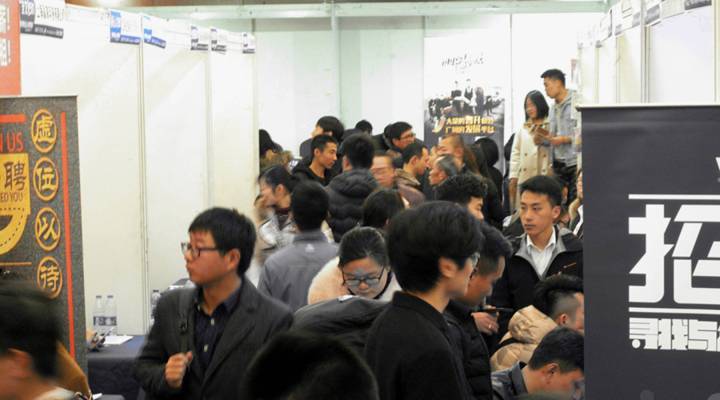
China’s post-Lunar New Year job exodus

At a job fair in a mid-level Shanghai hotel called Huaxia, more than a hundred job hunters mill around dozens of booths set up by eager employers.
Some recruiters are so fired up, they’re grabbing job seekers in the hallways outside.
“You looking for a job?” a woman calls out to bewildered job seekers.
“Come and see what we have,” another man says.
March and April are a busy time for recruiters. Some companies want to expand their business following the Lunar New Year and they need more workers. At the same time, some employees are looking for a change.
According to a newly released 2018 spring survey from leading job site Zhaopin, almost 70 percent of the 50,000 white-collar workers surveyed nationwide were starting a new job or actively looking for new work with an updated resume.
It is hard for one survey to represent the whole picture in a country with hundreds of millions of workers, but there is no doubt that the two months after Lunar New Year, traditionally known as the “jobs season,” is a busy time for job seekers and recruiters.
“Employees usually receive their annual bonuses before the Lunar New Year, so those who want to change jobs will do it after the holiday,” Chen Ziqi, Zhaopin’s public relations director, said.
Sometimes employees can quit abruptly.

Deng Shiheng is part of China’s job-hopping generation. He has switched at least four industries over the last eight years.
“I once had a colleague who received his annual bonus then left the next day at noon. That was a bit much,” Huijia Fitness’ sales executive Deng Shiheng said.
Deng, 23, said he had switched jobs at least four times over the last eight years, usually after he’d collected his year-end bonus. He is part of the so-called job-hopping generation, whose members grew up as China prospered and will quit readily if they can get a better salary or benefits with another employer.
Or as in the case of Wang Jingyi, they quit a job before lining up another one beforehand.
“If I don’t like my employer and I can’t stay at the company one minute longer, and I will just leave. I’ve done it before and found a new job within two months,” Wang said.

Wang Jingyi works in the insurance sales business, which she said has a high turnover rate.
The 24-year-old said she also considers whether she likes a job, whether a company has opportunities for promotion and whether there are good prospects in the industry.
This is a different way of thinking from from her parents’ and grandparents’ generation, who knew what it was like not to have enough to eat and rated job stability more highly.
However, Wang is not at the job fair looking for work. She’s a manager at China Life Insurance and looking to recruit. She would not say how many people quit her company over the holiday period, but she told Marketplace that she is looking to fill 20 positions.
“It’s hard to retain talent, not many people have the persistence needed to do a sales job,” Wang said.
A 2016 study by the professional networking site LinkedIn found that only 13 percent of workers in China stayed in the same industry for more than two decades, compared with 28 percent in the United States and Canada.
The study attributes this higher turnover in China to the fact that the country is still developing. Rapid changes to the economy create new industries or jobs that attract talent.
According to Geass Talent’s headhunter Janet Tu, firms are wising up to the post-New Year exodus.
“Some companies will give annual bonuses in the summer rather than at the end of the year, or split the bonus into three payments to prevent sudden talent loss,” Tu said.
Other firms, like a Hong Kong design company called Yirong International, rely on perks.
The company’s marketing director Chen Rui, who is not related to Zhaopin’s Chen Ziqi, is at the job fair looking to recruit 15 people for the company’s Shanghai office.
“For employees who have worked with us for more than three years, we will give their parents cash and gifts twice a year. This can amount to $150 a year per employee,” Chen said.
The company also offers other benefits, such as no compulsory overtime and giving workers Saturdays off, which is unusual in China.
“We also organize training each month and travel tours for the staff twice a year,” Chen said.
If all that doesn’t tempt current employees to stay, then the companies can look for new ones in what has become the jobs season. Recruitment fairs like the one at Huaxia hotel are held somewhere in China almost every day between March and April.
There’s a lot happening in the world. Through it all, Marketplace is here for you.
You rely on Marketplace to break down the world’s events and tell you how it affects you in a fact-based, approachable way. We rely on your financial support to keep making that possible.
Your donation today powers the independent journalism that you rely on. For just $5/month, you can help sustain Marketplace so we can keep reporting on the things that matter to you.


















